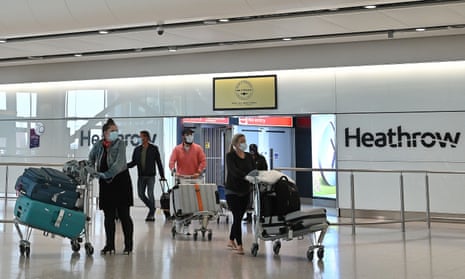A two-week quarantine period for all travellers arriving in Britain risks devastating an aviation industry already crippled by the Covid-19 outbreak, Boris Johnson is being warned.
It is understood that the 14-day quarantine period will be announced by the prime minister, alongside a slight loosening of the lockdown measures that were introduced to slow the spread of the virus. Mass quarantine upon arrival has not previously been used as part of Britain’s response.
The measure is expected to be introduced within weeks and imposed on all except those coming from Ireland. Passengers will have to give an address for their immediate self-isolation. Fines and deportation will be among the possible punishments for breaching the rules.
There was immediate alarm from some quarters of the aviation sector, which warned that the effect of the measures would not be confined to airlines. “Quarantine would not only have a devastating impact on the UK aviation industry, but also on the wider economy,” said Karen Dee, chief executive of the Airport Operators Association (AOA). “If the government believes quarantine is medically necessary, then it should be applied on a selective basis following the science, there should be a clear exit strategy, and the economic impact on key sectors should be mitigated.
“The government should commit to a weekly review of the quarantine measures and publish the evidence that informs the review’s outcome.”
She called for any plan to be accompanied by help for the industry and its workers.
Others in the industry are demanding to see the details and the science that informed the move. A spokesman for Airlines UK said: “We need to see the detail of what they are proposing. We will be asking for assurances that this decision has been led by the science and that government has a credible exit plan, with weekly reviews to ensure the restrictions are working and still required.”
The bosses of Belfast International Airport have already written to the government asking for clarification. They said they had not been consulted on the plans. A spokeswoman said: “We have written to government asking for clarification and outlining the serious effect this would have not only on our business but also, and more importantly, on the economy of Northern Ireland.”
Gatwick airport said that the impact on the industry meant a sector-specific extension of the job retention scheme, which allows companies to furlough staff while the state pays 80% of their wages, should be introduced. Business rate relief and the waiving of regulation fees are also being demanded.
A Heathrow spokesman said: “Any measures agreed must meet three key tests: they must be medically effective, meet public expectations and be deliverable by airports. Heathrow is more than just an airport, it is the heart that keeps economic blood flowing for this country, and it is vital our industry has the ability to bounce back quickly when the UK is ready to build back Britain together.”
At the Downing Street press conference yesterday, transport secretary Grant Shapps said the aviation industry had “both a short-term problem because people are not flying now and a longer-term recovery issue”. He said both he and chancellor Rishi Sunak had told the sector that conversations about “bespoke” help could be held.
Figures released to Labour MP Stephen Doughty showed that fewer than 300 people arriving in the UK were quarantined in the run-up to coronavirus lockdown on 23 March.
